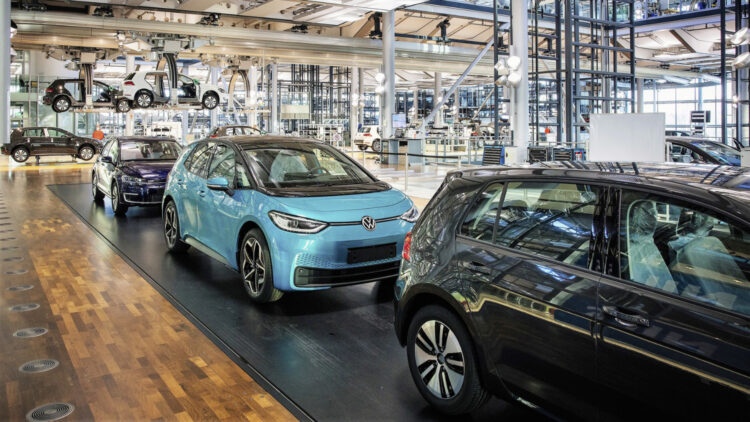In 2020, Volkswagen brand met the European Union’s CO2 emission target for the brand with average EU fleet emissions of 92 g/km for VW cars.

Volkswagen Passenger Cars claims to have exceeded the ambitious European CO2 fleet targets for 2020 and produced around six million grams fewer CO2 than required by EU law. The VW brand passenger car fleet of new vehicles in the European Union achieved average CO2 emissions of 92g/km – the legal CO2 target for the VW brand was 97g/km. As a result, CO2 emissions fell by 22 percent compared to the previous year. However, the larger Volkswagen Group is expected to receive a €100 million fine for exceeding the limits.
VW Met EU Emissions Target in Europe with Electric Car Sales in 2020
Electric car sales — both hybrids and full battery-electric vehicles — were the key to lowering the Volkswagen brand’s fleet emissions in Europe in 2020. With the start of the electric offensive, Volkswagen has already delivered more electric vehicles in 2020 than ever before – 212,000 units. At 134,000, the portion of fully electric vehicles tripled when compared to the previous year – of which 56,500 vehicles were the fully electric ID.3 model.
The Volkswagen ID.3 was the most frequently delivered BEV in Finland, Slovenia, and Norway in December 2020. In the Netherlands, the ID3 was the top seller for three months in a row. In Sweden, the ID.3 was the top-selling car in December 2020 in absolute numbers – regardless of the type of drive. In the Netherlands and Germany, Volkswagen Passenger Cars also managed to leap to the number one spot in all-electric vehicles over the full-year 2020 – with a share of 23.8 percent in Germany in the BEV market and 23 percent in the Netherlands.
Volkswagen’s Electrification Plans to Meet EU Emission Targets
In 2021, Volkswagen will expand its offerings based on the modular electric drive matrix (MEB): This way, the fully electric models ID.4, ID.4 GTX, and ID.5 will gradually be launched in international markets.
Between 2020 and 2024, Volkswagen will invest more than eleven billion euros into electric mobility, transform further production facilities such as Emden or Chattanooga (USA) following the plants in Zwickau and Dresden, and wants to bring 20 new fully electric models onto the market by 2025.
“Volkswagen continues to advance the transformation of the industry. In 2015, we kicked off the largest and most comprehensive electric offensive in the industry. By significantly exceeding our CO2 targets, we have shown that the brand is on the right track. In 2021, we will continue to accelerate the transformation towards electric mobility with new models,” said Volkswagen Passenger Cars CEO, Ralf Brandstätter.
Volkswagen brand (and Audi) met the targets but not sufficiently for the larger Volkswagen Group, including amongst others also Porsche, Seat, and Skoda, to avoid a fine of over €100 million for exceeding the CO2 target during 2020.
The final confirmation by the EU Commission on the fleet targets is to follow at a later date.
About the Volkswagen Brand
The Volkswagen Passenger Cars brand is present in more than 150 markets throughout the world and produces vehicles at over 50 locations in 14 countries. In 2020, Volkswagen delivered 5.3 million vehicles including bestselling models such as the Golf, Tiguan, Jetta, or Passat. Currently, 195,878 people work for Volkswagen across the globe. The brand also has over 10,000 dealerships with 86,000 employees.
